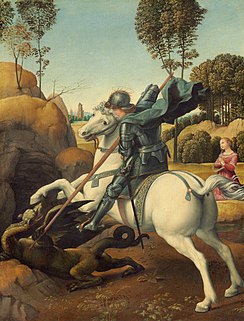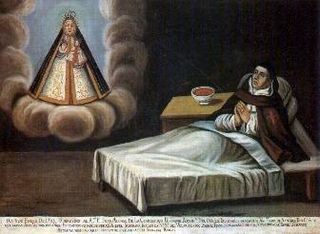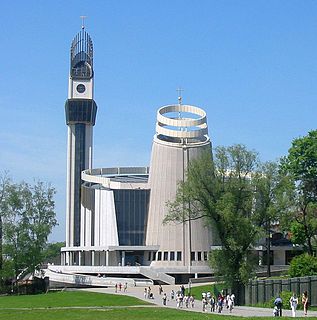
The liturgical year, also known as the church year or Christian year, as well as the kalendar, consists of the cycle of liturgical seasons in Christian churches that determines when feast days, including celebrations of saints, are to be observed, and which portions of Scripture are to be read either in an annual cycle or in a cycle of several years.

Saint Joseph's Day, 19 March, the Feast of Saint Joseph is in Western Christianity the principal feast day of Saint Joseph, husband of the Blessed Virgin Mary and legal father of Jesus Christ. It has the rank of a solemnity in the Catholic Church. It is a feast or commemoration in the provinces of the Anglican Communion, and a feast or festival in the Lutheran Church. Saint Joseph's Day is the Patronal Feast day for Poland as well as for Canada, persons named Joseph, Josephine, etc., for religious institutes, schools and parishes bearing his name, and for carpenters. It is also Father's Day in some Catholic countries, mainly Spain, Portugal, and Italy. It is a holiday of obligation for Catholics, unless the particular Episcopal Conference has waived the obligation.

The calendar of saints is a traditional Christian method of organizing a liturgical year by associating each day with one or more saints and referring to the day as the feast day or feast of said saint. The word "feast" in this context does not mean "a large meal, typically a celebratory one", but instead "an annual religious celebration, a day dedicated to a particular saint".
In the Catholic Church, holy days of obligation are days on which the faithful are expected to attend Mass, and engage in rest from work and recreation, according to the Third Commandment.

The term Octave of Easter refers to the eight-day period (octave) in Eastertide that starts on Easter Sunday and concludes with the Sunday following Easter. The Octave Day of Easter refers only to that day. It is also called Low Sunday, particularly in the Anglican Communion. It may be called Thomas Sunday, especially among Eastern Christians, or Quasimodo Sunday and Quasimodogeniti, among other names. On 30 April 2000, it was also designated as Divine Mercy Sunday by Pope John Paul II.

Saint George's Day, also known as the Feast of Saint George, is the feast day of Saint George as celebrated by the English and by various Christian Churches and by the several nations, kingdoms, countries, and cities of which Saint George is the patron saint.

The Eastern Orthodox Liturgical Calendar describes and dictates the rhythm of the life of the Eastern Orthodox Church. Passages of Holy Scripture, saints and events for commemoration are associated with each date, as are many times special rules for fasting or feasting that correspond to the day of the week or time of year in relationship to the major feast days.

The Divine Mercy of Jesus, also known as the Divine Mercy, is a Roman Catholic devotion to Jesus Christ associated with the apparitions of Jesus to Saint Faustina Kowalska. The Roman Catholic devotion and venerated image under this Christological title refers to what Faustina's diary describes as "God's loving mercy". Saint Faustina was granted the title "Secretary of Mercy" by the Holy See in the Jubilee Year of 2000. Sister Faustina Kowalska reported a number of apparitions during religious ecstasy which she wrote in her diary, later published as the book Diary: Divine Mercy in My Soul. The three main themes of the devotion are to ask for and obtain the mercy of God, to trust in Christ's abundant mercy, and finally to show mercy to others and act as a conduit for God's mercy towards them.

Divine Mercy Sunday is celebrated on the Sunday after Easter, the Octave Day of Easter. The feast day is observed by Roman Catholic as well as some Anglicans. It is originally based on the Catholic devotion to the Divine Mercy that Saint Faustina Kowalska reported as part of her encounter with Jesus, and is associated with special promises from Jesus and indulgences issued by the Church.

The Divine Mercy image is a depiction of Jesus based on the devotion initiated by Saint Faustina Kowalska.

The Chaplet of the Divine Mercy, also called the Divine Mercy Chaplet, is a Christian devotion to the Divine Mercy, based on the Christological apparitions of Jesus reported by Saint Faustina Kowalska (1905–1938), known as "the Apostle of Mercy." She was a Polish religious sister of the Congregation of the Sisters of Our Lady of Mercy and canonized as a Catholic saint in 2000.
The General Roman Calendar is the liturgical calendar that indicates the dates of celebrations of saints and mysteries of the Lord in the Roman Rite, wherever this liturgical rite is in use. These celebrations are a fixed annual date; or occur on a particular day of the week ; or relate to the date of Easter. National and diocesan liturgical calendars, including that of the diocese of Rome itself as well as the calendars of religious institutes and even of continents, add other saints and mysteries or transfer the celebration of a particular saint or mystery from the date assigned in the General Calendar to another date.

Romuald Jałbrzykowski was a Polish Catholic priest. From 1925 to 1926 he was the bishop of Łomża; from 1926 to 1955, archbishop of Wilno (Vilnius) and from 1945 to 1955, bishop of Białystok.
This is a calendar of saints list for the Armenian Apostolic Church.
Lists of holidays by various categorization.
Saint Liberata and Saint Faustina of Como "were sisters who lived as holy virgins in Como, Italy, during the 6th century. They founded the Convent of Santa Margarita in the town and both died around 580 AD.

The Divine Mercy Sanctuary in Kraków, Poland is a Roman Catholic basilica dedicated to the Divine Mercy devotion, as the resting place of Saint Faustina Kowalska, canonized on April 30, 2000.

The National Shrine of the Divine Mercy is a church dedicated to the Divine Mercy in Marilao, Bulacan, the Philippines. It was elevated to the status of National Shrine by Archbishop Orlando Quevedo of the Catholic Bishops Conference of the Philippines. The first Mass was held at the site on February 2, 1992, the Feast of the Presentation.

Don Bosco Church at North Paravur, Kerala, is a church of Paravur Parish under the Roman Catholic (Latin) Diocese of Kottappuram. Situated near Perumpadanna Junction at Paravur-Cherai road, this is one of the few churches in India named after Don Bosco. The Church is a pilgrim place were there were many sightings of sacred blood stains on a pedestal bronze oil lamp (Nilavilakku). Thousands of devotees of all religions attend the Novena of The Sacred Heart on Fridays. The blessed oil from the lamp is believed to possess miraculous healing power. Thanks giving letters and offerings by the devotees are the testimonials of this Divine Intervention.











